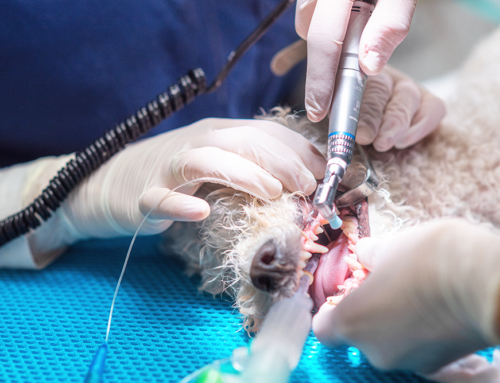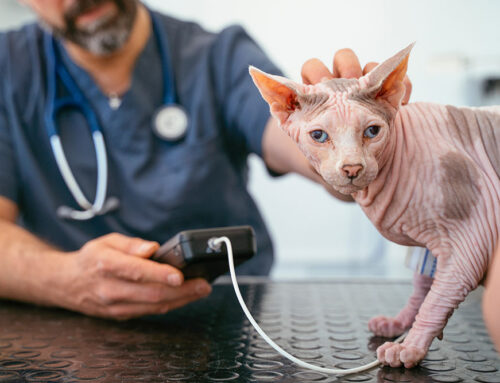Arthritis is a common, painful disease in cats and dogs that can significantly affect their quality of life. While no cure is available for this progressive condition, your pet’s discomfort can be reduced if the disease is diagnosed early, and managed appropriately. Our team at Willow Wood Animal Hospital would like to provide information about arthritis, and explain signs that may indicate your pet is affected.
Pet arthritis basics
In a normal, healthy joint, cartilage acts as a cushion, to allow adjoining bones to move smoothly over each other as the joint extends and flexes. Synovial fluid also helps provide lubrication to assist this movement. In a joint affected by arthritis, the cartilage has deteriorated and the synovial fluid loses lubricating properties, resulting in inflammation, pain, and decreased range of motion. Arthritis reportedly affects about 20% of dogs and 40% to 92% of cats. Several factors contribute to your pet developing arthritis.
- Age — Middle-aged and senior pets are commonly affected as the cartilage breaks down from wear and tear.
- Obesity — Excess weight puts extra stress on joints, and fat tissue releases inflammatory mediators that affect joints, leading to arthritis.
- Injuries — Fractures or soft tissue injuries in and around a joint can lead to arthritis.
- Breed — Large- and giant-breed dogs are at higher risk for arthritis.
- Developmental issues — Developmental conditions, such as hip and elbow dysplasia and patellar luxation, can predispose a pet to arthritis.
- Infections — Joint infections or systemic infections, such as Lyme disease, can lead to arthritis.
Pet arthritis signs
Subtle changes in your pet’s behavior and body position can indicate arthritis. Signs include:
- Stiffness — Overt limping is rare in arthritic pets, especially cats, but you may notice they are stiff after resting. In some cases, your pet may favor a limb initially, but improve as they move around.
- Hesitancy — Arthritic pets may have difficulty navigating stairs. Dogs may be hesitant to jump on or off furniture, and cats may be hesitant to leap to high areas where they previously enjoyed resting.
- Lethargy — Your pet may be less willing to play, and may spend more time sleeping or resting.
- Weight gain — Arthritic pets may gain weight, since they cannot be as active as usual.
- Irritability — Your pet may become more irritable, and may not want to be petted.
- Muscle loss — You may notice your pet has lost muscle mass over the affected area.
- Accidents — Dogs may have difficulty posturing to urinate or defecate, and may start having accidents in the house. Cats may have a hard time getting in and out of the litter box.
- Poor grooming habits — Your pet may not be able to groom themselves properly, resulting in dull or matted hair.
Pet arthritis management
If you suspect your pet may have arthritis, our veterinary professionals will perform a thorough clinical evaluation, assessing their gait, and palpating their joints. In addition, X-rays will be taken to determine joint changes that have occurred. Once a diagnosis has been made, a management plan will be devised for your pet. Approaches include:
- Weight loss — If your pet is overweight, they will be put on a weight loss plan to relieve the extra strain on their joints.
- Controlled exercise — Regular controlled exercise, such as leash walking and swimming, can improve joint mobility and muscle strength. However, uncontrolled exercise, such as racing around a dog park, can place excess pressure on your pet’s joints, resulting in permanent damage.
- Environmental changes — You can make changes to your home environment to help improve your pet’s comfort level. Ensure they have a comfortable, well-padded place to rest, and ensure their bedding, food and water bowls, and litter box are easily accessible. Raising their food and water bowls can also help if they have arthritic changes in their neck or shoulders. For arthritic cats, provide a litter box that has at least one low side to help them get in and out. In addition, provide ramps so your pet can access their favorite spots without jumping on or off high surfaces.
- Medications — Prescription medications, such as non steroidal anti-inflammatories, can greatly reduce your pet’s pain.
- Supplements — Supplements, or a prescription diet that contains supplements, such as chondroitin sulfate, glucosamine, fish oils, and green lipped mussels, may be recommended.
- Physical therapy — Active and passive stretching, and strengthening and balancing exercises, can improve strength and mobility without causing additional stress on the joint.
- Surgery — Surgical procedures to remove damaged tissue or replace the joint may be necessary to improve your pet’s quality of life.
Pet arthritis prevention

As pets age, many will develop arthritis, but you can take certain steps to help prevent your pet from being affected.
- Feed an appropriate diet — Puppies and kittens should be fed a diet specifically designed for their needs. Large- and giant-breed puppies, in particular, require special food, to ensure they don’t develop conditions such as hip and elbow dysplasia. Keeping your pet at a healthy weight can decrease their arthritis risk.
- Visit your veterinarian regularly — Your pet should visit our veterinarians regularly for wellness exams to ensure early detection, diagnosis, and treatment for signs or conditions that could lead to arthritis.
Recognizing arthritis in the early stages will help manage the condition, and help ensure your pet remains happy and pain-free. If you are concerned your pet may be suffering from arthritis, contact our American Animal Hospital Association-accredited team at Willow Wood Animal Hospital, so we can get them moving again.






Leave A Comment